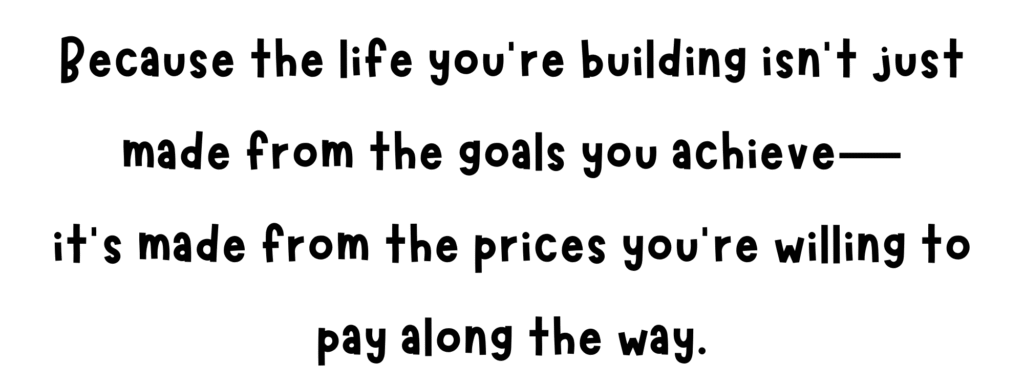We often think of goals in terms of what we’ll gain—success, growth, joy, progress, pride. We picture the rewards waiting for us at the finish line.
But what we don’t always consider is the other side of the story: the quiet, hidden cost of every goal.
Because every “yes” we give to a goal is also a quiet “no” to something else. And recognizing that trade-off is just as important as setting the goal itself.
Every Goal Asks Something of You
When you set a goal, you’re not just choosing a destination—you’re choosing what you’re willing to give in exchange.
- A career goal may ask you to trade late nights, hobbies, or weekends.
- A health goal may ask you to give up comfort, old routines, or indulgence.
- A relationship goal may ask you to let go of pride, independence, or even parts of your old identity.

The costs aren’t always obvious at the start. They reveal themselves along the way, often in quiet, subtle moments—when you’re torn between staying late to finish work or going home to rest… when you’re faced with a slice of cake during your health journey… when you realize that chasing one dream means shelving another.
It’s not about good or bad. It’s about awareness.
The Unseen Currency of Time and Energy
The two most precious currencies you spend on your goals are time and energy.
Time is limited. Energy is finite. And no matter how strong your willpower, every choice uses them up.
When you choose to pursue one goal, you’re silently deciding that another part of life will receive less of you. That’s the hidden cost.

This is why it matters to pause and ask:
- Is this worth the hours of my life it will take?
- Is this worth the mental and emotional energy I’ll spend?
- Does this bring me closer to who I want to be—or just busier?
When you see time and energy as sacred, you begin to choose goals more intentionally.
The Cost of Not Choosing

There’s another side to this too: not setting a goal also has a cost.
- If you never set financial goals, you may pay with future security.
- If you never set health goals, you may pay with vitality later on.
- If you never set personal growth goals, you may pay with stagnation, wondering “what if?”
Avoiding the cost of commitment often leads to a higher price later—the regret of an unlived life.
So it’s not about avoiding cost altogether. It’s about choosing wisely which price you’re willing to pay.
Releasing the Illusion of “Having It All”
One of the greatest sources of stress is the belief that we can chase every goal at once, without sacrifice. That somehow, we can achieve everything, keep everyone happy, and still remain balanced.

But reality is more tender, more human than that.
Every choice shapes the shape of your days. Every “yes” carries a silent “no.” You can do many things over a lifetime, but not all at once.
When you release the illusion of “having it all,” you find peace in choosing what matters most right now.
How to Weigh the Cost with Grace
Here are a few gentle ways to reflect on the hidden cost of your goals:
1. Ask yourself what this goal will require of you.
Before chasing it, name the sacrifices upfront. Sleep? Free time? Comfort? Money? Relationships?
2. Decide if the exchange feels true.
Some sacrifices will feel painful but right. Others will feel wrong the moment you admit them. Your intuition knows the difference.
3. Notice what you’re saying “no” to.
If you’re saying yes to a promotion, maybe you’re saying no to free evenings. If you’re saying yes to writing a book, maybe you’re saying no to hours of social scrolling. Seeing both sides clearly removes guilt.
4. Remember that costs can shift.
A cost that feels too high today might feel worth it later. Seasons change, and so do we. Give yourself permission to re-evaluate.
The Beauty in the Trade-Off
Here’s the deeper truth: the cost of a goal isn’t always a burden—it can also be a gift.

When you trade late nights for a healthier body, you gain vitality.
When you trade comfort for growth, you gain resilience.
When you trade short-term pleasures for a long-term vision, you gain meaning.
Every sacrifice shapes you into someone new. The hidden cost is also the hidden transformation.
Choosing Your Yes

At the end of the day, setting goals is less about achievement and more about alignment.
The real question isn’t: “Can I do this?”
It’s: “Is this the right yes for me, here and now?”
Because when your yes is aligned—when you’re willing to embrace both the reward and the cost—your goals stop being heavy obligations. They become chosen paths.
And chosen paths, even with their sacrifices, feel lighter than unchosen ones.
Closing Thought
Every goal has a hidden cost. Every dream asks for an offering.
But that offering is not just what you lose—it’s also what you become.
So when you set your goals, don’t only ask what you’ll gain.
Ask, too, what you’re willing to give.






